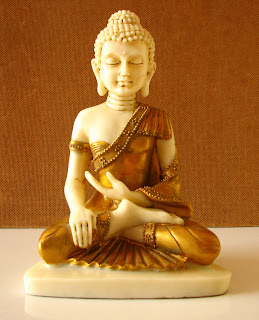Reading Notes: The Life of Buddha, Part A
Notes for The Life of Buddha by Andre Ferdinand Herold
A little statue of Buddha from Mistvan (source: Wikimedia).
- Queen Maya
- Impregnated by a white elephant with six tusks in her dream
- Cures the sick through touch while pregnant
- Believes her child must be born in budding flowers
- Passed away seven days after giving birth
- King Suddhondana
- Is told that the spirit chose his family because of its fame, good fortune, and virtue
- Orders food and drink to be given to the poor after hearing he would be the father of a Buddha
- Could not undertake any project that did not prosper after becoming a father
- Surrounded by loyal friends
- Does not want Siddhartha to see the real world
- "Siddhartha must see nothing that will trouble the serenity of his soul; he must never suspect the evil there is in the world. I shall order the road cleared of beggars, of those who are sick and infirm and of all who suffer."
- "Only the rich, the young and the beautiful were allowed on the streets he drove through, and they stopped to watch him as he went by. Some praised him for the kindness of his glance, others extolled his dignified bearing, still others exalted the beauty of his features, while many glorified his exuberant strength. And they all bowed before him, like banners dipped before the statue of some God."
- Drives all ill, aged, and crippled out of the city
- Brahmans are the most mentioned caste
- Prince Siddhartha
- Son of King Suddhodana and Queen Maya
- 3 encounters make him aware of suffering in the world
- His birth caused the whole world to tremble with joy, everything bloomed or bore fruit, drunks became sober, and the wicked were cleansed
- Asita
- A hermit revered by the king
- Claims Siddhartha will "destroy the evil of rebirth"
- "...Noticed that the king's son bore the marks of omnipotence."
- Mahaprajapati
- Queen Maya's sister
- Took care of Siddhartha after Maya died
- Scolded by a goddess when she puts jewels on Siddhartha
- Called "mother" by Siddhartha
- Visvamitra
- The teacher that instructs the young Sakyas in the art of writing
- Realizes he cannot teach Siddhartha anything because he already knows all 64 varieties of script
- Siddhartha's first encounter
- "And he, at the sight of the city's splendor, at the sight of the wealth of the men and the beauty of the women, felt a new joy pour into his soul.
- But the Gods were jealous of the celestial felicity enjoyed by this city of the earth. They made an old man, and, in order to trouble Siddhartha's mind, they set him down on the road the prince was traveling."
- The charioteer explains that the man has been crippled by old age
- "So old age destroys memory and beauty and strength in man, and yet the world is not frantic with terror! Turn your horses around, O charioteer; let us return to our homes. How can I delight in gardens and flowers when my eyes can only see old age, when my mind can only think of old age?"
- The prince could no longer find peace and there was no longer any joy in his heart
- Siddharta's second encounter
- Sees an old man with a disease
- "Men see suffering and sickness, yet they never lose their self-confidence! Oh, how great must be their knowledge! They are constantly threatened with sickness, and they can still laugh and be merry!"
- The prince learned to fear sickness
- Siddharta's third encounter
- Death
- Gopa
- Siddhartha's wife
- Monk
- Looks like a beggar and approaches the prince
- Visible only to the prince
- A God in the form of a monk in an attempt to arouse the prince
- Siddharta's request to leave
- Wants to become a monk
- The king abdicates to try to keep him at home
- Will agree to the abdication if the king promises four things: 1) his life will not end in death, 2) sickness will not impair his health, 3) age will not follow his youth, and 4) misfortune will not destroy his prosperity



Comments
Post a Comment